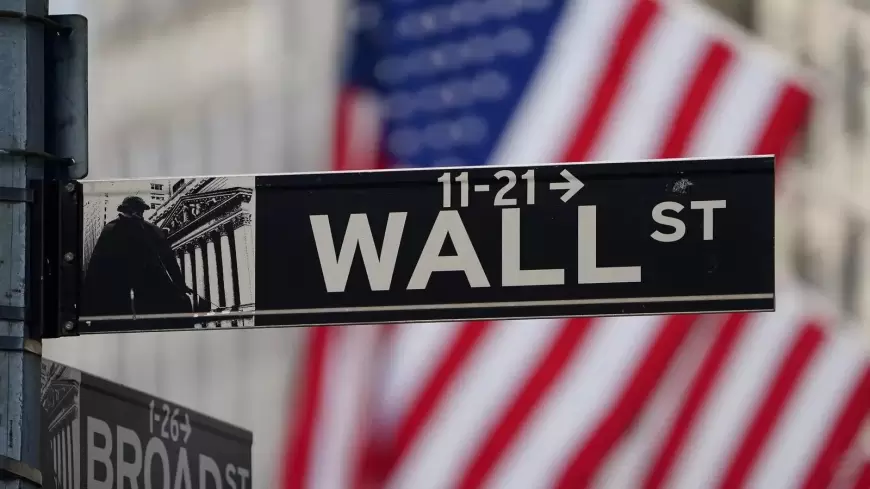Live Market Update: Stocks Ease Ahead of Fed Meeting, Tech Shares Retreat
Stay informed with the latest market trends as stocks pull back before the Federal Reserve meeting. Get insights on tech stock movements and corporate updates.

Investors witnessed a modest retreat in the stock market today, as all eyes turned to the impending Federal Reserve policy meeting.
The S&P 500 index dipped by around 0.2%, while the Dow Jones Industrial Average showed slight gains, a departure from its previous session's positive momentum. However, the tech-heavy Nasdaq Composite experienced a more pronounced decline, sliding approximately 0.5%. This downward trend was exacerbated by Nvidia shares slipping following updates on artificial intelligence (AI) from its annual developer conference.
The Federal Reserve's two-day meeting, which commenced Tuesday morning, is being closely monitored by investors. The market, which has been rattled by recent inflation surprises, is eagerly anticipating any hints about the timing of potential interest-rate adjustments.
Although it is widely expected that the Fed will maintain interest rates at their current levels, investors are particularly interested in the "dot plot" for insights into the number and timing of future rate adjustments. The Federal Reserve's decision is scheduled to be announced on Wednesday at 2 p.m. ET.
In other central bank news, the Bank of Japan made headlines by ending its 17-year streak of negative rates with its first rate hike, adding to the week's flurry of central bank decisions.
Also Read: Federal Judge Criticizes SEC's Conduct in Blockchain Firm Dispute
In the realm of cryptocurrencies, bitcoin experienced a decline of over 5% from its recent peak, hovering just above the $63,000 mark. This marks its most significant one-day loss in two weeks. Correspondingly, shares of companies closely tied to the crypto market, such as Coinbase and Marathon Digital, also saw declines.
Shifting to corporate developments, Unilever's stock received a boost after the company announced plans to streamline operations by cutting jobs and spinning off its ice cream division.
Key Moments
- Stocks retreat as investors await Federal Reserve meeting.
- Tech stocks, including Nvidia, dip ahead of AI conference updates.
- Attention on Federal Reserve's "dot plot" for rate adjustment clues.
- Unilever's stock rises after announcing job cuts and ice cream unit spinoff.
-
Are AI Stocks in a Bubble? Insights from Nvidia's Conference and BofA Survey
With Nvidia's (NVDA) GTC conference ongoing and BofA's new fund manager survey released, the debate over the AI stock bubble intensifies.
The outcome? Institutional investors remain uncertain if the current AI frenzy signifies a bubble.
-
Here's the breakdown on Nvidia
Nvidia's (NVDA) stock remained relatively steady during the first day of its GTC conference, despite the company introducing a slew of impressive new products.
However, this lack of immediate movement shouldn't be seen as a disappointment. On the contrary, CEO Jensen Huang showcased a range of highly sophisticated innovations that may require some time for investors to fully understand and evaluate before deciding if the stock merits further growth.
Fortunately, Wall Street responded positively to Nvidia's announcements.
JPMorgan analyst Harlan Sur commented:
"In general, the company continues to distance itself with its aggressive schedule of new product releases and ongoing product diversification. With cutting-edge silicon (GPU/DPU/CPU), comprehensive hardware and software platforms, and a robust ecosystem, Nvidia is strategically positioned to capitalize on significant long-term trends in AI, high-performance computing, gaming, and autonomous vehicles."
-
Market Retreats Ahead of Fed Meeting: Stocks Dip as Investors Await Rate Policy Decision
Before the Federal Reserve's crucial two-day meeting to determine interest rate policy, Wall Street experienced a slight downturn.
The S&P 500 index dipped by approximately 0.2%, contrasting with the Dow Jones Industrial Average, which showed slight gains following Monday's positive performance. However, the Nasdaq Composite, heavily influenced by technology stocks, saw a decline of about 0.5%. Notably, Nvidia, a prominent player in artificial intelligence (AI), experienced a retreat after unveiling updates from its annual developer conference.
-
Morning Market Movers: Stocks Shaping the Day's Trends
Here's a glimpse at the morning's stock market activity, with notable movements grabbing attention:
Unilever (UL): Starting the day with a 2% rise, Unilever made waves with its decision to spin off its ice-cream business, home to beloved brands like Magnum and Klondike. The company also outlined a restructuring strategy affecting 7,500 jobs, aiming to achieve savings exceeding $800 million over the next three years.
Bitcoin (BTC-USD): Experiencing its most significant daily downturn in two weeks, Bitcoin traded at around $63,000, witnessing a 7% decline from recent highs as investors opted to capitalize on previous gains.
Nvidia (NVDA): Despite unveiling its latest AI chip at its annual developers conference, Nvidia's stock slipped by 3% this morning. The new chip boasts remarkable speed enhancements over its predecessor.
Super Micro Computer (SMCI): Shares of the server manufacturer plummeted by 11% after announcing plans to sell 2 million shares, generating approximately $2 billion. The funds will bolster operations and manufacturing capacity. This move comes amidst a surge in Super Micro's shares this year, fueled by rising demand for AI technology.
This overview sheds light on the dynamic shifts unfolding in the morning market, shaping the day's trading landscape.
-
Potential Ramifications of Realtor Settlement on Homebuyers
The recent settlement of a major realtor lawsuit, which aims to relieve home sellers from hefty commissions, could have significant implications for homebuyers already grappling with rising interest rates and soaring home prices.
According to a report, homebuyers, who are already facing challenges due to limited inventory, may soon find themselves responsible for agent commissions if the settlement is approved by a federal judge.
Traditionally, both sellers and buyers split the 6% commission, with each party paying 3%. However, if the settlement is finalized, this standard commission structure would be eliminated, placing the burden of agent compensation solely on buyers.
Under the proposed model, buyers would need to cover their agent's fees in addition to the usual expenses such as down payments, financing, and closing costs.
While there is speculation that this change could lead to a decrease in home prices, experts remain skeptical. Economic factors such as supply and demand play a more significant role in determining home prices, and the settlement alone may not have a substantial impact.
As noted, the Federal Reserve's interest rate policies are also unlikely to directly address housing affordability concerns, further complicating the situation for homebuyers.
-
Japan's Move: No More Negative Interest Rates
Japan has made a significant shift in its monetary policy, marking the end of an era of negative interest rates. The Bank of Japan, the last major central bank to adopt negative rates, has decided to terminate its aggressive stimulus program aimed at reviving the economy from a prolonged slump.
In a historic move on Tuesday, Japan's central bank abolished its negative policy rate of minus 0.1% and introduced a new target range of 0.0-0.1%. This decision, the first interest rate hike in 17 years, signifies the conclusion of an unconventional monetary experiment undertaken by major central banks post-global financial crisis to stimulate economic growth.
Bank of Japan Governor Kazuo Ueda commented, "The long-standing interest rate policy, coupled with other measures to inject liquidity into the economy, have served their purpose."
Unlike the US Federal Reserve, which is poised to lower rates this summer in response to historic inflation levels, Japan's central bank has grappled with a different economic challenge: the pursuit of growth. Japan had kept borrowing costs low to encourage consumer and business spending, providing a much-needed impetus to the economy. Notably, inflation in Japan has exceeded the Bank of Japan's 2% target for over a year.
While media reports earlier in the week had hinted at the impending move, its impact on the market on Tuesday was somewhat muted. Nonetheless, Tokyo's benchmark Nikkei 225 index saw a gain of nearly 0.7%, while the dollar remained steady at around 150 yen.



































































